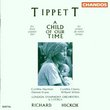| All Artists: Dmitry Kabalevsky, Alexander Glazunov, Aram Khachaturian, Bryden Thomson, London Philharmonic Orchestra, Raphael Wallfisch Title: Kabalevsky: Cello Concerto No. 2 Op. 77 / Khachaturian: Cello Concerto / Glazunov: Chant du Ménestrel Op. 71 - Raphael Wallfisch / London Philharmonic Orchestra / Bryden Thomson Members Wishing: 0 Total Copies: 0 Label: Chandos Original Release Date: 1/1/2000 Re-Release Date: 10/28/1992 Album Type: Import Genre: Classical Styles: Chamber Music, Forms & Genres, Concertos, Historical Periods, Classical (c.1770-1830), Instruments, Strings Number of Discs: 1 SwapaCD Credits: 1 UPC: 095115857922 |
Search - Dmitry Kabalevsky, Alexander Glazunov, Aram Khachaturian :: Kabalevsky: Cello Concerto No. 2 Op. 77 / Khachaturian: Cello Concerto / Glazunov: Chant du Ménestrel Op. 71 - Raphael Wallfisch / London Philharmonic Orchestra / Bryden Thomson
CD DetailsSimilar CDs
|
CD ReviewsPerformances strong and persuasive! David A. Hollingsworth | Washington, DC USA | 02/02/2000 (5 out of 5 stars) "The First Concerto for Cello and Orchestra (1949) of Dmitri Kabalevsky (1904-1987) was among the works written for children (Kabalevsky did much to improve musical curricula for the young). The work is of simplicity and gaity, with some noble and perhaps melancholic writings embetted (mostly in the second movement). The Second Concerto for Cello and Orchestra (1964), at least to an extent, relates to his mournful Requiem (1966) in some of the serious and disturbing passages. The orchestral textures thicken in the Second Concerto (Saxophone employed) and the cello passages are met with greater demands. In fact, by the 1940s, Kabalevsky's works are more reflective and inward-looking than before, and the Second Concerto strikes me as the work with emotional depth and overwhelming contemplations at the final bars. Hints of Shostakovich, Prokofiev, and even Myaskovsky (in darker moods and melancholic passages) are present. But no doubt in my mind that the piece is among the most personal composition which flowed out of the composer's pen. The premiere was performed by Kabalevsky and the Leningrad Philharmonic, with cellist Daniel Shafran (to whom the work is dedicated). Melodiya/EMI recorded the 1969 performance (nla-never re-issued in CD form). Shafran, who passed on in 1998, gave thoroughly a persuasive and authoritative account in that 1969 performance. He had such a feel to the work that it became his own identity. Kabalevsky and the Leningrad Philharmonic provided great support to the demanding cello role. The same really could be said on Raphael Wallfisch and Bryden Thomson with the London Philharmonic. Like Shafran, Wallfisch captured the darkness, the seriousness of the piece and is ultimately no less persuasive and appealing than the former. Thomson's pace was not as different from Kabalevsky's although Thomson added slightly more majesty to his overall reading. The London Philharmonic was perfectly responsive and supportive.The performances remained consistently well-played on the Khachaturian's Cello Concerto. The work is tuneful, attractive, yet as bombastic and hardly a sign of substantial development (the first movement-allegro moderato is the best movement). The ideas became cliches and therefore lost some of its originality towards the remaining two movements. Glazunov's Chant du Menestrel (1900) is a charming, memorable filler to this otherwise enjoyable disc.I dare hope that the Shafran/Kabalevsky recording of the Second Concerto find its place in record shops in a CD re-issue. But the Chandos CD should do wonders in the meanwhile."
|


 Track Listings (7) - Disc #1
Track Listings (7) - Disc #1
